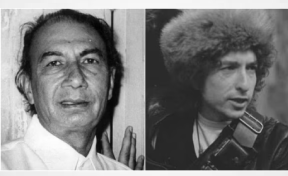A recent judgment by the Gujarat High Court quoted from Time, a song by British rock band Pink Floyd. Here are some fascinating moments from the Indian judiciary when it turned to song for emphasis
And then one day you find
Ten years have got behind you
No one told you when to run
You missed the starting gun…”
These lines from the noted British rock band Pink Floyd’s Time opened a recent judgment by the Gujarat High Court while ruling on a case involving delays in issuing show-cause notices by the Customs Department. In an unexpected reference, the bench, comprising Justice Bhargav Karia and Justice DN Ray, was trying to point to the criticality of timely action in legal matters. It was interesting, unconventional, and made a complex legal issue instantly relatable.
While courts around the world have often used song lyrics and poetry to explain a point, with Bob Dylan being one of the most cited artistes (186 times according to a 2007 study by Tennessee law professor Alex Long), with the line ‘You don’t need a weatherman to know which way the wind blows,’ being the most referenced, and The Beatles following closely, Indian courts, not usually known for being creative, have also sometimes used the unconventional route. It not only makes the judgments more accessible, it also reinforces the idea that the law, much like a song, should resonate with the people. Here are a few instances when Indian courts stepped out of the rigid confines of the legal language and used song and poetry to make a point.
Justice Makarand Katju’s Poetic and Poignant Judgements
In a departure from the usual and often complex legalese used in judgements, one of the most prominent ones in this category has been Justice Makarand Katju’s judgement quoting Mirza Ghalib in the Aruna Shanbaug mercy killing case dealing with euthanasia laws remains significant. In his 2011 judgement, he wrote, ‘Marte hain aarzoo mein marne ki, Maut aati hai par nahin aati (One dies longing for death but death, despite being around, is elusive)’ attempting to explain the pain that the Mumbai nurse went through for 37 years that she lived in a vegetative state. She finally died in 2015.
In another of his judgments, Justice Katju opened his ruling with the famous line from the Faiz Ahmed Faiz ghazal Gulo mein rang bhare – a poem of longing. Qafas udaas hai yaaron sabaa se kuch to kaho, Kaheen toh beher-e-khuda aaj zikr-e-yaar chale (This birdcage is forlorn/ Call upon the gentle wind, friends to petition the Lord, to fill the quiet around us, with beautiful descriptions of my beloved), wrote Justice Katju, ruling on a petition filed for a man named Gopal Dass, who was detained in Pakistan’s Lahore Central Jail for spying. After the Supreme Court appealed on his behalf, Pakistani President Asif Ali Zardari released him on humanitarian grounds. He returned after spending 27 years in prison.
Bob Dylan in the Court
Bob Dylan, while a favourite in American courts, also featured during the Kerala High Court proceedings when in 2017 PR Ramachandra Menon and Justice Dama Seshadri Naidu quoted him with the lines, ‘The times they are a-changing’, during a petition against the state’s liquor policy, where the claimant claimed that the policy was a violation of one’s fundamental rights. While the judgment spoke of the policy being there for the benefit of the community, the Dylan line implied that things don’t always remain the same. Here was law embracing cultural references to enhance the impact of a verdict.
Sahir Ludhianvi’s Poetic Presence
The evocative poetry of Sahir Ludhianvi, the poet who captured human emotions and poignant realities of the world with a sensitivity reserved only for him, has also found its way into a slew of Indian judgments. In the 2011 Bofors case, Chief Metropolitan Magistrate Vinod Yadav cited Ludhianvi’s lyrics from BR Chopra’s Gumrah (1963) to highlight the need for closure in unresolved cases. He took the famed ‘Woh afsana jise anjaam tak lana na ho mumkin, use ek khoobsurat mod dekar chhodna hi achha (If a story cannot reach its conclusion, it is best to end it on a graceful note) from the song Chalo ikk baar phir se ajnabi ban jaaye hum dono. Another line from the same song was cited in a 2011 dowry harassment case where the Additional Sessions Judge Kamini Lau asked the complainant woman to let go of the difficult relationship with her husband and in-laws. She quoted the line Taarruf rog ho jaaye to usko bhoolna behtar; Taalluk bojh ban jaaye to usko todna achcha (If an acquaintance becomes a burden, it is better to forget it; if a relationship turns into a weight, it is better to break it). It was entering a challenging space with much sensitivity, thus breaking the aridness of the legal language that sometimes forgets that there are people at the end of the decision.
Read more
https://indianexpress.com/article/india/music-meets-gavel-indian-judgments-songs-poetry-9919626/




